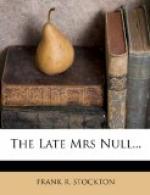“Oh, yaas’m,” said Uncle Isham, “dar ain’t on’y one place fur dat. It’s de clober fiel’, ober dar, on de udder side ob de gyarden.”
“And what is to be planted in it?” asked Mrs Null.
“Ob course dey’s gwine to plough for wheat,” answered Uncle Isham, a little surprised at the question.
“I don’t altogether like that,” said Mrs Null, her brows slightly contracting. “I’ve read a great deal about the foolishness of Southern people planting wheat. They can’t compete with the great wheat farms of the West, which sometimes cover a whole county, and, of course, having so much, they can afford to sell it a great deal cheaper than you can here. And yet you go on, year after year, paying every cent you can rake and scrape for fertilizing drugs, and getting about a teacupful of wheat,—that is, proportionately speaking. I don’t think this sort of thing should continue, Uncle Isham. It would be a great deal better to plough that field for pickles. Now there is a steady market for pickles, and, so far as I know, there are no pickle farms in the West.”
“Pickles!” ejaculated the astonished Isham. “Do you mean, Miss Null, to put dat fiel’ down in kukumbers at dis time o’ yeah?”
“Well,” said Mrs Null, thoughtfully, “I don’t know that I feel authorized to make the change at present, but I do know that the things that pay most are small fruits, and if you people down here would pay more attention to them you would make more money. But the land must be ploughed, and then we’ll see about planting it afterward; your mistress will, probably, be home in time for that. You go after the men, and tell them I shall expect them to begin the first thing in the morning. And if there is anything else to be done on the farm, you come and tell me about it to-morrow. I’m going to take the responsibility on myself to see that matters go on properly until your mistress returns.”
Letty and her son, Plez, occupied a cabin not far from the house, while Uncle Isham lived alone in a much smaller tenement, near the barn and chicken house. That evening he went over to Letty’s, taking with him, as a burnt offering, a partially consumed and still glowing log of hickory wood from his own hearth-stone. “Jes’ lemme tell you dis h’yar, Letty,” said he, after making up the fire and seating himself on a stool near by, “ef you want to see ole miss come back rarin’ an’ chargin’, jes’ you let her know dat Miss Null is gwine ter plough de clober fiel’ for pickles.”
“Wot’s dat fool talk?” asked Letty.
“Miss Null’s gwine to boss dis farm, dat’s all,” said Isham. “She tole me so herse’f, an’ ef she’s lef’ alone she’s gwine ter do it city fashion. But one thing’s sartin shuh, Letty, if ole miss do fin’ out wot’s gwine on, she’ll be back h’yar in no time! She know well ’nuf dat dat Miss Null ain’t got no right to come an’ boss dis h’yar farm. Who’s she, anyway?”
“Dunno,” answered Letty. “I done ax her six or seben time, but ’pears like I dunno wot she mean when she tell me. P’raps she’s one o’ ole miss’ little gal babies growed up. I tell you, Uncle Isham, she know dis place jes as ef she bawn h’yar.”




